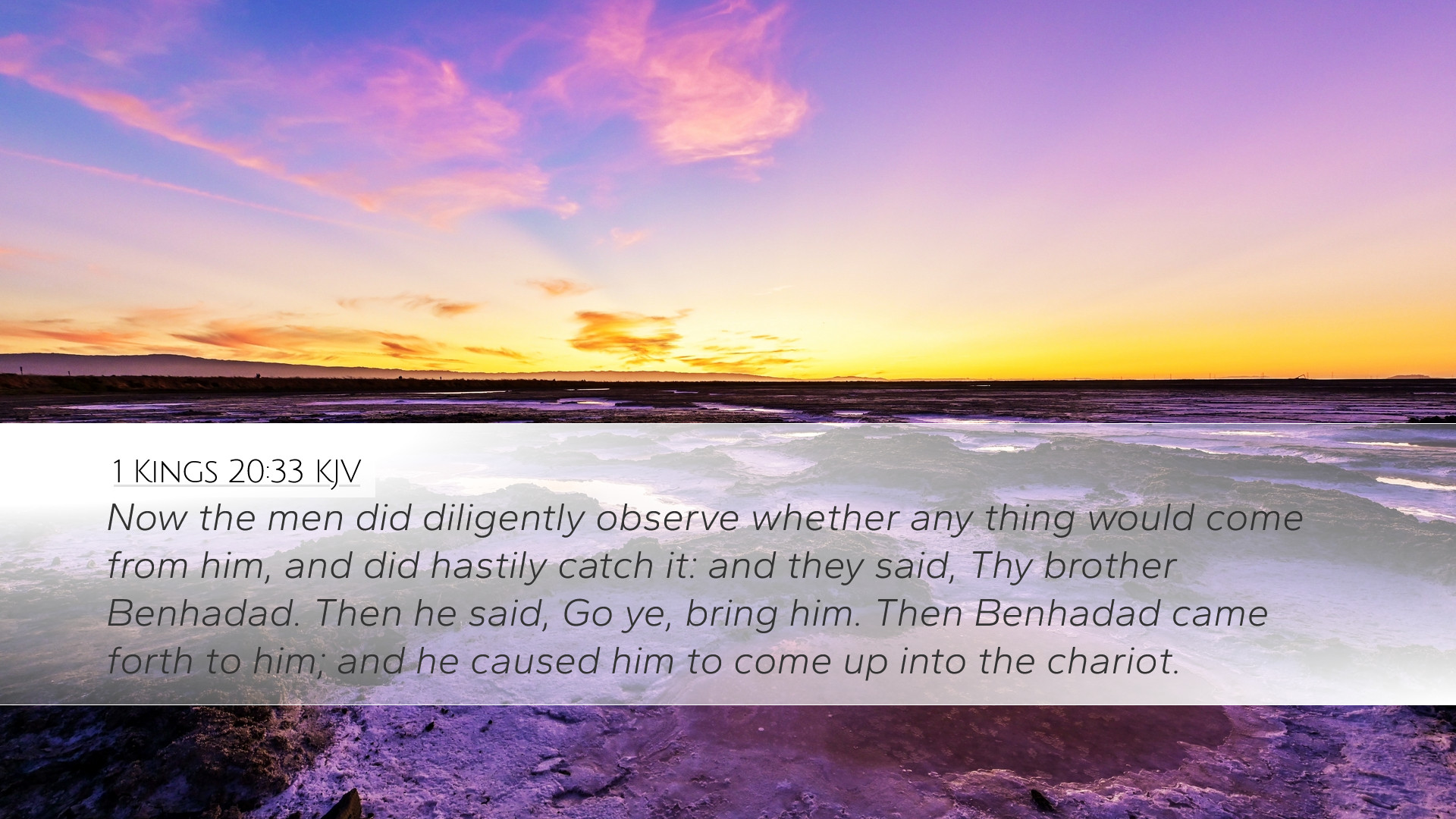Commentary on 1 Kings 20:33
Verse: "Now the men observed diligently, and they hasted to catch. And he said, Thy servant went out to the battle; and, behold, a man turned aside, and brought a man unto me, and said, Keep this man: if by any means he be missing, then shall thy life be for his life, or else thou shalt pay a talent of silver." (1 Kings 20:33, KJV)
Introduction
This verse occurs within the narrative of Ahab’s conflict with Ben-Hadad of Syria, highlighting a moment of critical deception and the ensuing consequences of failing to execute divine commandments. A careful analysis of the text and its surrounding context reveals important lessons regarding accountability, leadership, and the sovereignty of God in human affairs.
Contextual Background
The backdrop of this passage falls within the historical account of Israel’s military engagements under Ahab, characterized by his tumultuous reign and the prophetic challenges he faced. The narrative unfolds as Ahab, having defeated Ben-Hadad, is confronted with the moral implications of mercy extended to a divinely designated adversary. This opens the door to an examination of the integrity of Ahab and the wise counsel he receives.
Insights from Commentators
Matthew Henry's Commentary
Accountability in Leadership: According to Henry, this passage exposes a grave sin among leaders: the failure to uphold their responsibilities. Ahab's half-heartedness in executing judgment upon Ben-Hadad, despite the clear directive from the prophet, illustrates a recurring theme. Henry emphasizes the importance of leaders being vigilant in their duties and the repercussions of failing to act justly. He notes that Ahab's disregard for God’s command ultimately leads to deeper calamities for the nation.
Albert Barnes’ Notes on the Bible
The Importance of Observing Divine Instructions: Barnes reflects on the significance of the fate that befell the Hebrew people as a result of their king’s misjudgment. He draws attention to the phrase “Thy servant went out to the battle,” indicating Ahab's attempt to absolve himself from the solemn responsibility he bore as a monarch. Barnes argues that every individual, particularly those in positions of authority, must recognize their obligations and act upon divine directives without compromise.
Adam Clarke’s Commentary
Symbolism of the Talent of Silver: Clarke provides insightful commentary on the metaphorical implications of the ’talent of silver’ referenced in the verse. He elucidates that the ‘talent’ represents not just a monetary penalty but more so a weighty consequence of moral failure. Clarke emphasizes the moral law, underlining that a leader’s neglect can lead to his downfall, echoing the broader theme of divine justice in human affairs.
Thematic Reflections
1. The Nature of Leadership
Leadership is instituted by God and entails significant responsibility. Ahab’s actions serve as a dire warning to those in authority about the necessity of courage and fidelity to God’s commands. The account illustrates that leadership without integrity can have dire consequences not just for the leader but for the entire community.
2. The Weight of Accountability
Each individual, particularly leaders, are accountable for their decisions. The gravity of Ahab’s choices exemplifies how neglecting divine accountability can lead to grave outcomes. This serves as a reminder to contemporary leaders to take their roles seriously and act with foresight, integrity, and obedience to God.
3. The Sovereignty of God
Throughout the narrative, the sovereignty of God remains paramount. Even amidst human failure, God’s purpose prevails. The encounter not only highlights Ahab’s moral crisis but also underscores the inevitable fulfillment of God’s will, reflecting His power to turn human decisions toward an ultimate good.
Practical Applications for Today
- For Pastors: Emphasize the necessity of guiding their congregations with integrity, ensuring that teachings are aligned with biblical truths.
- For Students and Theologians: Engage in rigorous study of biblical texts to discern and understand the implications of God’s commands on leadership and accountability.
- For Every Believer: Foster a life of personal accountability, recognizing that faithfulness to God’s directives holds profound significance in one’s relationship with Him and with others.
Conclusion
The account in 1 Kings 20:33 serves as a compelling reminder of the dynamics of leadership, the importance of accountability, and God’s unwavering sovereignty. By honestly reflecting on Ahab's choices, modern-day leaders can glean vital lessons on the significance of adhering faithfully to God's will—understanding that true leadership is demonstrated by obedience to His commands, regardless of personal ambition or societal pressures.


